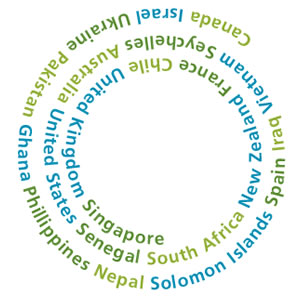Judicial Conference in Australia Identifies Issues of Common Concern to Courts in all Countries.
Some of the issues facing the judiciary are the same the world over, while others differ dramatically from country to country. I recently encountered these similarities and differences at the conference of the International Organization of Judicial Training (IOJT) held in Sydney, Australia in October.
Countries as diverse as Solomon Islands, Iraq, Pakistan, the Seychelles, Australia and the United States agreed that juvenile delinquency, self represented litigants, and judicial independence are areas of major concern in each of their respective legal systems. Of these, there was universal agreement that judicial independence was of the greatest importance.
 An example of some the striking dissimilarities were those cited by Chief Justice of Iraq– trafficking in women and money laundering. Major legal issues in the Solomon Islands revolve around that society’s widely held view of women as personal property rather than persons possessing human rights.
An example of some the striking dissimilarities were those cited by Chief Justice of Iraq– trafficking in women and money laundering. Major legal issues in the Solomon Islands revolve around that society’s widely held view of women as personal property rather than persons possessing human rights.
The IOJT conference provided a wonderful opportunity for educators to meet and discuss judicial training as the critical means by which these and other major concerns can be addressed. Other topics included distance education, judicial evaluations and training for more tenured judges.
Judicial independence was discussed extensively. While the delegates agreed on the importance of this issue, each country’s experience varies greatly. In the U.S., Canada, and Australia, the context of discussion of an independent judiciary is mainly one of avoiding encroachment by the legislative or executive branches. In other countries, judicial independence is literally a life and death reality. For example 36 Iraqi judges have been killed recently for the decisions they have made or merely because they were judicial officers. Some of the other countries which have experienced the assassination of judges are Columbia, the Philippines, and Rwanda. In addition to those killed and injured, many more judges are affected by the kidnap, torture and murder of family members.
Even though the magnitude of the problem differs from region to region, conference attendees agreed that a great danger to judicial independence is incompetency of judges. As a Justice of the Pakistan Supreme Court said, “Judicial competency generates public confidence in the system as a whole and helps secure appropriate funding.” Chief Justice Michael Black of the Federal Court of Australia identified another bulwark of judicial independence as that of the collegiality of judges. All agreed that education of the judicial branch as well as the public is vital. “Judges need to explain (to the public) what they do and why,” said Justice Black.
I presented my paper, prepared as a representative of the National Judicial College, on my experiences over the last eight years as a faculty member of NJC web-based courses. In the same session on distance education, Judge Felix Azon Vilas (Spain) spoke on the exciting efforts being made in Europe to train judges via the internet. These programs are helping to unify nations who were engaged in deadly combat only a relatively short time ago during World Wars I and II. Milt Nuzum and Judge Thomas Zachman explained the gigantic leaps in judicial education Ohio has taken by delivering a portion of the training in an e-learning format. Mr. Waleed Malik, The World Bank (USA), gave interesting insights into the assistance provided by the World Bank to countries seeking to utilize the internet to train judges.
Separate sessions included: Organizing Pan-Continental Legal Training (mainly via the web) and Developing Online Learning among Countries. Many in this country might be surprised to see the valuable lessons to be gained from the e-learning experiences of so-called “developing countries.” Due to distances between large urban areas and lack of financial resources, these countries have become very creative in using distance learning techniques. The extent of distance education in South America is truly amazing. Not limited by national boundaries, the Justice Studies Center of the Americas makes judicial education available to a large and increasing number of South and Central American judges.
A sampling of other conference offerings includes: Enhancing Judicial Performance, Institutionalizing Judicial Training in a Developing Country Context, Interactive Skills Training for Judges, and Developments in Judicial Education around the World.